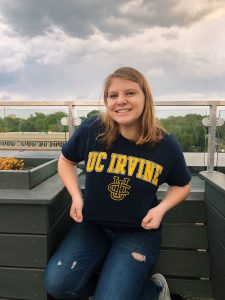NSF GRFP Applicant Fellowship Mentor Consultation Program
About the Program
The Graduate and Postdoctoral Scholars Resource Center (GPSRC) offers fellowship mentorship support to graduate students applying to the NSF Graduate Research Fellowship Program (GRFP). All Fellowship Mentors have received NSF-GRFP awards and/or a honorable mention, and are trained to mentor you through the process of creating your own stellar application in a supportive environment. We also present a Roadmap for crafting high-stakes applications that takes you from pre-writing to polished statements, which we encourage you to use and adapt as you chart your path towards success.
Services Offered
Eligibility
Use this roadmap to chart your route to a successful fellowship application! This roadmap is developed by the Mentorship Alliance and based on the NSF GRFP Primer written by Dr. William Head, who has served as a reviewer for the NSF GRFP Fellowship program and has mentored many students through a successful fellowship application process. The goal of this roadmap is to empower you to find your own way through the application process by offering you engaging modules for each milestone along the way.
Below is an example roadmap schematic that includes many of the pre-writing milestones we encourage you to work through. All of the milestones and strategies in this example roadmap are explained in detail as you work through the “Roadmap for Crafting High-Stakes Fellowship Applications.”

Fellowship Mentors are trained to help you at any stage of your application! There are two general stages of the application process: the pre-writing stage, and the statement draft stage.
Pre-writing Support:
Not sure how to start? Struggling to put your ideas on paper? Fellowship Mentors are trained to guide you through a variety of pre-writing methods to get the ball rolling and your ideas flowing. With our pre-writing framework you’ll develop a writing ritual and, working with your CV, mindmaps, and storyboards you’ll construct the framework of your statements that meet the merit review criteria at a benchmark level and that wow the fellowship reviewers!
Statement Draft Support:
Work with the Fellowship Mentors to design your statement structure, develop your key statements, hone your narrative, and polish your statements. Bring an early draft or a more polished version of your personal statement or your research statement to the consultation. Mentors are trained to work with you regardless of your research discipline.
Is This Process Worth It?
If your goal is to create a benchmark fellowship application, working through the Fellowship Application Modules while meeting consistently with Fellowship Mentors will get you there!
The Fellowship Application Modules introduce you to concepts and techniques important for fellowship writing so that you have the power to develop, revise, and polish your application statements. As you work through the Modules, you’ll draw your fellowship application roadmap, set application milestones, and establish a game plan. You’ll learn about fellowship review criteria, develop a routine for a successful application process, utilize the 4 Pillars framework as you craft mindmaps, storyboards, and statement drafts, and put on the reviewer’s lens as you revise and edit your statements to a benchmark level. This is a challenging process but it can guide you to a successful application and will prepare you for future fellowship, scholarship, and grant applications.
To support you along your application journey, Fellowship Mentors will help you get to know the fellowship through the lens of the reviewer and will hold you accountable to your application roadmap. Through one-on-one consultations and drop-in hours, they’ll help you understand how reviewers use the merit review criteria to appraise applications. Mentors will guide you through the different writing stages that include pre-writing, drafting, revising, editing, polishing, and submitting! Working with Fellowship Mentors, you’ll set up your writing ritual and create a cadence of commitment and accountability.
Mentor Meetings
One-on-One Consultations:
Fellowship Mentors will meet with you for a 50 minute virtual consultation. They can help you with pre-writing, review your application materials, provide constructive feedback and direct you to helpful resources. All Fellowship Mentors are NSF-GRFP awardees or have received honorable mentions and can share tips on submitting a competitive proposal. After booking you will receive a pop up with the mentor’s email, you must send them your drafts/materials 24 hours prior to your session so they have time to review.
Book A One-On-One Appointment Here
Prepare For Your One-On-One Consultation
Prepare for your consultation to maximize your time with the mentors!
- Expect to meet one-on-one with a Fellowship Mentor for 50 minutes on Zoom.
- Be specific about your needs. When booking your consultation, indicate if you are seeking Pre-Writing Support or Statement Draft Support and whether you want to focus on the personal statement, the research plan, or another aspect of the application.
- If this is your first pre-writing consultation, bring an updated CV.
- After booking you must email your mentor the materials you will be reviewing a minimum of 24 hours in advance. (You will receive a CampusGroup message after booking with your mentors email address as well as a calendar invite and zoom link)
- Write down your questions ahead of time and include specific questions when you book your consultation.
- Review the eligibility criteria for the fellowship that you are applying for to make sure you are eligible. If you have specific questions about eligibility that you can’t find the answer to, stop by one of their drop-in hours
- Review the Roadmap and identify where you are in the process. Are there any steps you can take before your consultation?
- Be prepared to screen share your materials. Test your camera and audio prior to your appointment.
- Be prepared to read your writing out loud. This will feel strange. However, it is an effective method that helps writers hear the problems they can’t see and will significantly improve your writing.
- Be receptive to feedback. Fellowship Mentors are trained to listen, ask questions, and provide feedback to help you strengthen your application materials in a supportive setting.
- Please provide a 24 hour notice to the fellowship mentor if you must reschedule the consultation.
Fellowship Mentors are available to work with you wherever you are in the process. Don’t wait to start the application process – book your consultation on come to a drop-in hour today!
All mentors are trained to assist in all fields! Mentoring spots are limited. If one mentor is fully booked or their times do not work with you, please select another mentor even if they are not in your field.
All mentors have received an NSF-GRFP award of honorable mention.
Check back in August for 2025-2026 Fellowship Mentor Consultation Information
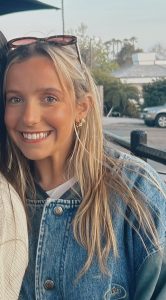
Consultations will be available in August
Hello, I’m Abbey Keegan, a third-year PhD student in the Mathematical, Computational, and Systems Biology (MCSB) program at UC Irvine. I conduct my research in the Eguchi Lab, where I study the efficacy of gene therapy in delaying the onset of heart failure in Duchenne Muscular Dystrophy. Broadly, I’m passionate about advancing translational science that improves human health.
My training in the MCSB program has fostered my interdisciplinary interests, allowing me to bridge cellular biology and bioinformatics. Before coming to UCI, I earned my undergraduate degree at The Pennsylvania State University, where I majored in vertebrate physiology and mathematics.
Beyond the lab, I enjoy experimenting with new recipes, relaxing by the beach, and cheering for Penn State athletics. My diverse academic and personal experiences have enabled me to develop a strong foundation across multiple disciplines, and I’m excited to support students as they navigate the NSF-GRFP application process.
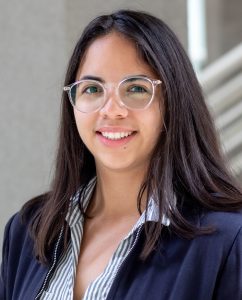 Consultations will be available in August
Consultations will be available in August
¡Hola! (Hi) I am a Ph.D. Candidate at School of Education who works with Dr. Judith F. Kroll at the Bilingualism, Mind, and Brain Lab. My work examines how cognitive and social factors moderate sociolinguistic variation through the use of psycholinguistic and neurolinguistic techniques. As a fellowship mentor, I have advised students in different fields such as: Psychology, Cognitive Neuroscience, Sociology, and Education. Two fun facts about me are: 1) I was born and raised in Puerto Rico, 2) I enjoy weightlifting and roller skating!
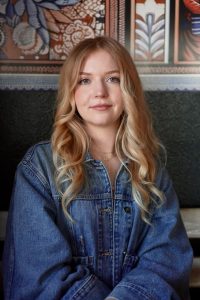
Consultations will be available in August
I am a third-year Ph.D student in the Department of Materials Science and Engineering. My research focuses on designing novel fluorescent nanomaterials for deep-tissue bioimaging and disease detection. I completed my B.S. in Materials Science and Engineering in 2023 at UCI, where I interned in the semiconductor processing field and was involved in dental ceramic research. I am passionate about scientific communication and interested in the ways that material science can contribute to technological advancement and solving global problems. In my free time, I love to paint, work in my garden, and run or hike.
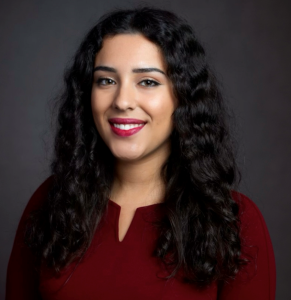
Consultations will be available in August
Hi, I’m Gabriella, and I’m a PhD candidate in Political Science. My work explores questions of power, colonialism, and security, often in the context of global environmental challenges. I’ve worked as a GRFP writing coach for several years now, and I’m excited to be back this year to support applicants through what can feel like an overwhelming process.
My approach to mentorship is relational and iterative. I believe the strongest proposals come from conversation, reflection, and attention to both clarity and depth. I’ve helped students across disciplines refine their narrative voice, articulate their research goals, and align their ideas with NSF review criteria. I’ve worked with both first-time and returning applicants, including several who went on to receive the fellowship or an honorable mention. I’m especially committed to supporting first-generation, international, and underrepresented students as they navigate the application process.
I’m looking forward to meeting with you!”
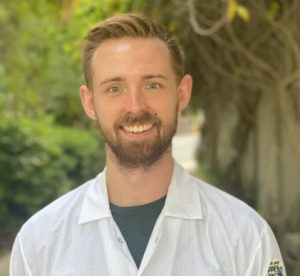
Consultations will be available in August
My name is Jacob Dohl, and I am a fifth-year graduate student in Dr. Elizabeth Head’s lab. My work has been primarily translational, initially focusing on understanding the role of mitochondria and metabolism in retinal disease, and subsequently transitioning into my current research, which involves exploring neuroinflammatory pathways in individuals with Down syndrome and Alzheimer’s disease. I have also been involved in mentoring throughout my graduate career, working with ReachOut TeachOut for the past five years, assisting with AWIS for four, and acting as an NSF mentor last year as well. I am excited to reprise my role as an NSF Mentor and help applicants refine their stories and science into a great application. Looking forward to working with you!
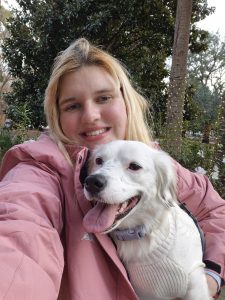
Consultations will be available in August
Katherine is starting her fourth year as a PhD Candidate in the Civil & Environmental Engineering department. Her research is at the intersection of public health and environmental engineering, focusing on water reuse and viruses. This is her third year being a graduate writing mentor. She enjoys working with students at all stages of writing (prewriting, editing, polishing, etc.) and finds being a mentor and honor and privilege. She has helped many students in past years win the NSF GRFP award and honorable mentions. On her free time she enjoys baking, playing with her puppy, and crocheting. She would love to guide you on your fellowship journey!
Consultations will be available in August
Hi! My name is Lena and I am a fourth year chemistry PhD candidate in the Shiraiwa and Nizkorodov research groups. My research focuses on how sunlight affects the properties of atmospheric aerosols and the implications on human health and climate. I am also passionate about improving accessibility in higher education among students from different backgrounds, especially those with learning disabilities or mental health challenges. Outside of lab, I enjoy spending time outdoors hiking, skiing, and playing soccer.
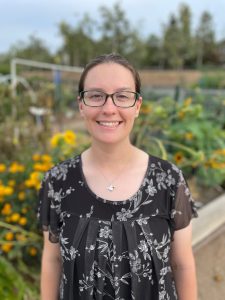
Consultations will be available in August
Hi, my name is Shannon and I’m a fourth year PhD candidate in the Department of Physiology and Biophysics. My research in Francesco Marangoni’s lab has focused on how PD-1 blockade, a cancer immunotherapy, impacts tumor T regulatory cells in immunogenic cancers. I grew up in San Diego and earned my B.S. from UCSD. In my free time I like to play video games, cross stich, and hike with my friends and family. My goal as an NSF mentor is to encourage applicants by sharing my own experiences and help them feel that applying to NSF is manageable. I look forward to meeting with you soon!
Meet The Mentorship Alliance
Fellowship Mentors are trained by the Mentorship Alliance. The Mentorship Alliance works within and among partnering institutions to build sustainable, equitable, evidence-based, and high-impact mentorship capacity to serve graduate and undergraduate students. The Mentorship Alliance is composed of graduate and undergraduate students across various disciplines at nine universities: UC Irvine, UC Santa Cruz, Oregon State University, University of Hawai’i at Mānoa, Yale University, Stanford University, University of Southern California, San Jose State University, and Cal State University at Monterey Bay. If you’d like to learn more about the Mentorship Alliance, please email our UCI Representative, Maya Silverman, at msilver2@uci.edu.

